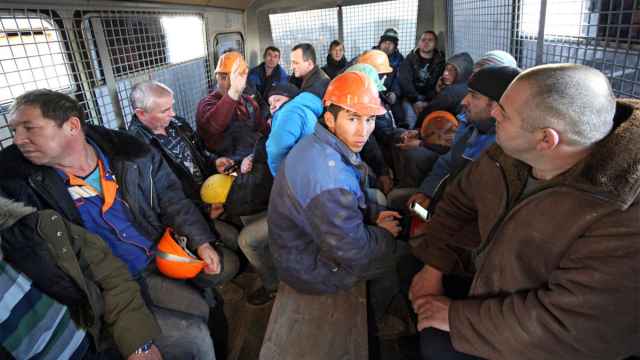Врач: doctor
Languages change. We know that. Of course, we know that. That’s why English speakers have trouble with Shakespeare’s plays — forget Chaucer! — and why Russians have books like Словарь редких и забытых слов (A Dictionary of Rare and Forgotten Words) and — my favorite — Что непонятно у классиков или Энциклопедия русского быта ХIХ века (What We Don’t Understand in Classical Literature or Encyclopedia of Russian Life in the 19th Century).
Sometimes the changes are confusing or, for many, annoying. For example, coffee. It entered Russian as кофей and кофий and was therefore considered a masculine noun. At some point in the last couple of centuries people began to spell it in Russian кофе but they kept its masculine gender (even though the ending in -е would have made in neuter). I don’t know if Russians hated that decision, but it was the bane of foreign students’ existence and the source of endless amusement when we asked for одно кофе (one [neuter] coffee). And then a few years ago, linguists gave in to logic and usage. They decided that кофе could be either masculine or neuter, as the speaker wished. Everyone hated that decision.
But while we’re kvetching about кофе, some far more dramatic changes have been forgotten. Take the word обязательно. It means certainly, without fail, definitely, necessarily. – Ты придёшь на вечеринку? –Обязательно! (“Are you coming to the party?” “I’ll be there, for sure!”) But the great linguist, translator and writer Kornei Chukovsky wrote in the 1920s about an older colleague who insisted that обязательно meant kindly and cited an example from literature: В отношении к нам он поступал обязательно (He treated us politely.)
Or how about words that went from being Very Good Things to Truly Terrible Things? Урод, for example. It originally meant the firstborn son, тот, кто стоит у рода (the one who stands at the head of the family). Being урод meant being fortunate. That seems to have gotten transformed into being beautiful and saintly. And that led to the notion of being не из мира сего (not of this world), weird, and finally ugly and deformed, physically or emotionally. Уродом не стала, шрам быстро зажил (The scar quickly healed and I didn’t turn into a monster). Я чувствовал себя моральным уродом (I felt like a moral degenerate). You might also hear this expression: В семье не без урода. Today that means “There’s a black sheep in every family,” but 400 years ago it wouldn’t have been true. It would have meant: “Every family has a son.”
Another word you don’t want to be called today is сволочь. Today this is a creep, a louse, a dishonest and unsavory person. Дело в том, что такая сволочь, как я, ничего самостоятельно делать не может (The thing is, a bastard like me can’t do anything on his own). But long, long ago it meant a pile of garbage or junk that had been swept up. Волочь/сволочь are verbs that mean to haul, push, gather up. I can’t tell when the noun appeared, but it was originally the junk and mess piled up, and then referred to a crowd of people, and then rabble, and then bad folks. But if you get sent back in time and someone tells you Убери эту сволочь!, they mean “clean up this mess” not “take this lowlife away.”
My favorite word transformation from good to bad is the word задница. Задница (“the thing behind”) was originally a form of inheritance in ancient Russian law. So a few hundred years ago, this would be good news: Получишь хорошую задницу! (You’re in for a big inheritance!). Now it is just a behind, that is, a human behind. Он принял душ и подставил задницу, куда медсестра воткнула шприц (He took a shower and exposed his bottom to the nurse, who stuck a needle in it). It’s also the place you send someone you don’t like: Пошёл в задницу (Go to hell!). And if you are in it, you are in a bad way. В любом случае, мы в заднице (Either way we’re screwed.)
Some changes went the other direction. Врач (doctor), for example, is derived from the word врать (to lie), and originally referred to a wizard or magician. Врачи were mostly found in monasteries and poor folks homes, and not much trusted. I haven’t been able to determine if Russian healers a thousand years ago uttered spells as they worked, or if they lied about their skills. In any case, those associations are pretty much long gone. Today — especially today — being a doctor and healing (врачевать) is a respected profession, for the most part. Вот вам лучшие люди, призванные врачевать раны и облегчать страданья человечества (These here are the best people, people who are called upon to heal wounds and ease the suffering of humankind).
Another word that went from bad to good is прелесть. Originally from лесть (flattery), it had the meaning of seduction or temptation. In the Bible змей хитростью своей прельстил Еву (The snake seduced Eve with its cunning.) But since one seduces or tempts with beauty and pleasure, over time the word lost the bad connotations and kept the notions of delight and charm. Какая прелесть! (Oh, how delightful!) Всё это часто придаёт большую прелесть разговору (All this imbues the conversation with great pleasure). “Delights” can also be someone’s beautiful aspects: Девушка еще не сознавала всю силу своих прелестей (The young woman did not yet appreciate the power of her charms).
And finally, sometimes words just changed in meaning altogether. Продажа was once a fine to be paid for any crime except murder (where presumably fines were not levied and the punishment was more final). Now it’s the sale of something, or the not-sale of something: Никто не соблюдает запрету на продажу сигарет несовершеннолетним (No one observes the ban on selling cigarettes to minors).
The most surprising word for me was трус. It was originally an earthquake. That actually makes sense, since it’s from the verb трястись (to shake). Не худо явить хоть небольшое чудо: или потоп, иль с трусом гром (It wouldn’t be bad to have a small miracle, either a flood or thunder with an earthquake).
People shake, too, especially when they are afraid. So a shaking person became трус, which became a coward. Although no one will admit to it: Никто не признавал себя трусом (No one considered himself a coward).
And before you ask, is this related to трусы (underpants, shorts), because, you know, there’s a whole lot of shakin’ going on? Of course not! My dictionaries tell me that трусы (also трусики) are from the French pantalon retroussé (rolled-up pants, shorts) — and are worn by уроды, врачи и всякие сволочи.






